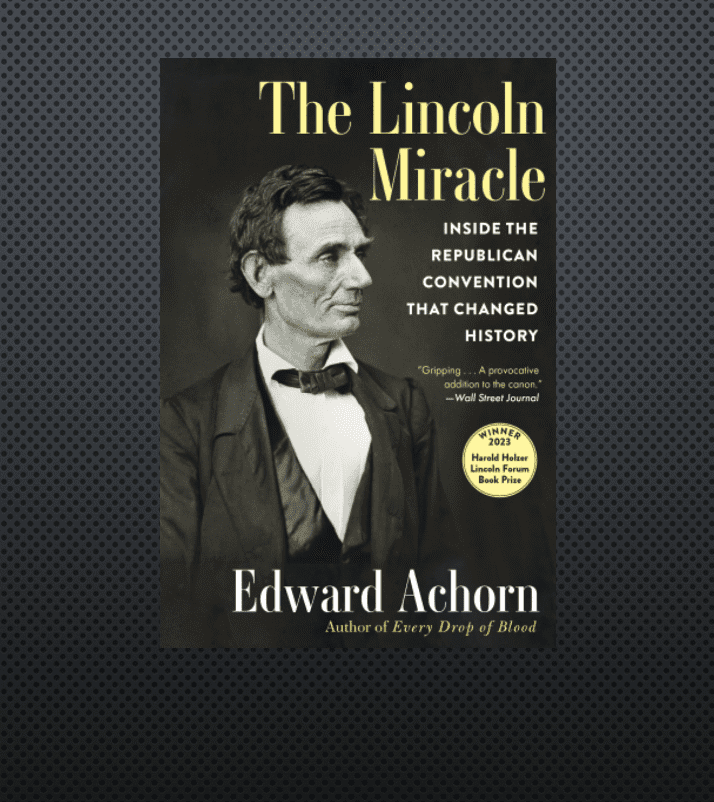Search Posts
Recent Posts
- Out and About in RI: Former Pawtucket Mayor Henry Kinch Tribute in Photos June 24, 2025
- Rhode Island Weather Forecast for January 24, 2025 – Jack Donnelly June 24, 2025
- ART! Mark Freedman, first featured artist of Summer Art Shows at Charlestown Gallery June 24, 2025
- The Bellevue Hotel: Procaccianti Co. New Luxury Boutique Hotel Set for Newport’s Iconic Bellevue Ave June 24, 2025
- Mike Stenhouse, CEO of RI Center for Freedom & Prosperity, named into College Baseball Hall of Fame June 24, 2025
Categories
Subscribe!
Thanks for subscribing! Please check your email for further instructions.

The Lincoln Miracle, by Edward Achorn – a book review by Jim Raftus
By Jim Raftus, contributing writer
Edward Achorn’s first Lincoln profile, Every Drop of Blood, published in 2020 used a microscopic approach focusing mainly on the 48 hours leading up to the newly re-elected President’s 1865 Inaugural Address. Achorn opens the aperture wider with his newest Lincoln tome, The Lincoln Miracle, which thoroughly documents the surprising and historically significant nomination of Abraham Lincoln at the Republican Convention during 4 days in May of 1860.
Achorn’s long career in journalism, serving as Vice President and Editorial Pages Editor of the Providence Journal until 2022, is reflected in his voluminous research into myriad resources which provide the content for The Lincoln Miracle. The Notes section appendaged to the back of the book is 38 pages long! Achorn’s diligence and reportorial skill combine to make The Lincoln Miracle a thoroughly readable history lesson. The author vividly portrays the tumultuous, raucous, and consequential nomination of Lincoln by Republicans in Chicago. Much more than a dry, facts laden explanatory volume, Achorn’s work brings readers through the mud and muck of the Chicago streets outside the newly built Wigwam Convention Center and into the mad political mayhem inside the 2 story wooden edifice.
The politics of this era were a tinderbox of flammable issues, chief amongst them the question of slavery. Democrats of the mid-1800’s were mostly aligned with the continuation, and even expansion, of slavery. The Republican platform, while not absolute in its condemnation of the practice, was against further proliferation of slavery onto Northern states and hinted at its demise.
William Henry Seward, Governor of New York from 1838 to 1842, was the prohibitive favorite to garner the Republican nomination to run against Democratic candidate Stephen Douglas. Other well known politicians such as Salmon Chase of Ohio and Edward Bates of Missouri were also considered ahead of Lincoln in the race. Power brokers such as newspaper icon Horace Greeley and Tammany Hall’s leader “Boss” Tweed played prominent roles in the Chicago contest. Their influence and bold bravado are clearly depicted in Achorn’s accounting.
The author assiduously details the many back room deals, promises made and promises broken which were used to sway convention delegates. The messy, often odious machinations of political theatre are evident in Achorn’s chronicling of the 1860 Republican convention. The writer’s vivid prose is seen in his synopsis of Lincoln’s ascension to the nomination on the 3rd vote: “The Republicans were staking their fortunes on an ungainly man of the people – who had split rails in his youth, who had risen by his own effort, who told jokes to ward off his devastating depression, and who had suffered crushing disappointments in his middle age but stubbornly persisted in his quest to preserve and expand the freedom that America promised.”
The Lincoln Miracle, while occasionally requiring some patience to wade through minutia, provides a unique and memorable look at a defining week in America’s history.
___

Jim Raftus retired from a 35 year career in marketing and sales in 2011.
Jim is a Veteran having served in the Army from 1968 to 1971. His primary posting was in Alaska. His Army days served as a chapter he wrote for local author Terry Nau’s book “Voices of the Vietnam War” published in 2019.Jim chronicles the guilt felt by many members of the military who served during Vietnam but were stationed elsewhere.
Jim’s work has also appeared in the Boston Globe, Providence Journal, New England Living Magazine The Valley Breeze, and RINewstoday.com
Jim’s higher education journey was an often interrupted 11 year journey which included credits from Roger Williams University, University of Rhode Island and the University of Alaska before finally earning a Bachelor of Arts degree from Rhode Island College in 1975. Jim was awarded the Outstanding Creative Writing Award at the commencement.
Jim served as the Foxboro correspondent for the Attleboro Sun Chronicle in the late 1970’s.
He is a Rhode Island native and long time resident of Cumberland.
Contact: jimraftus33@gmail.com
Read more: tinyurl.com/jimraftus
